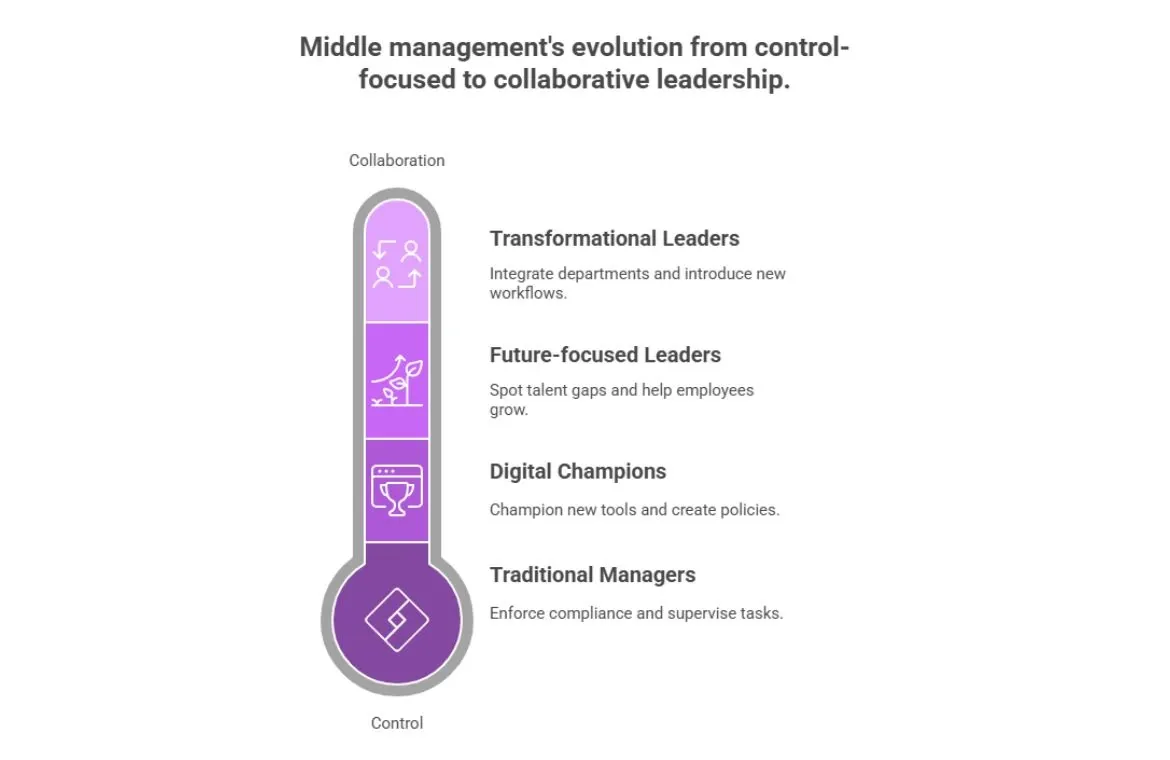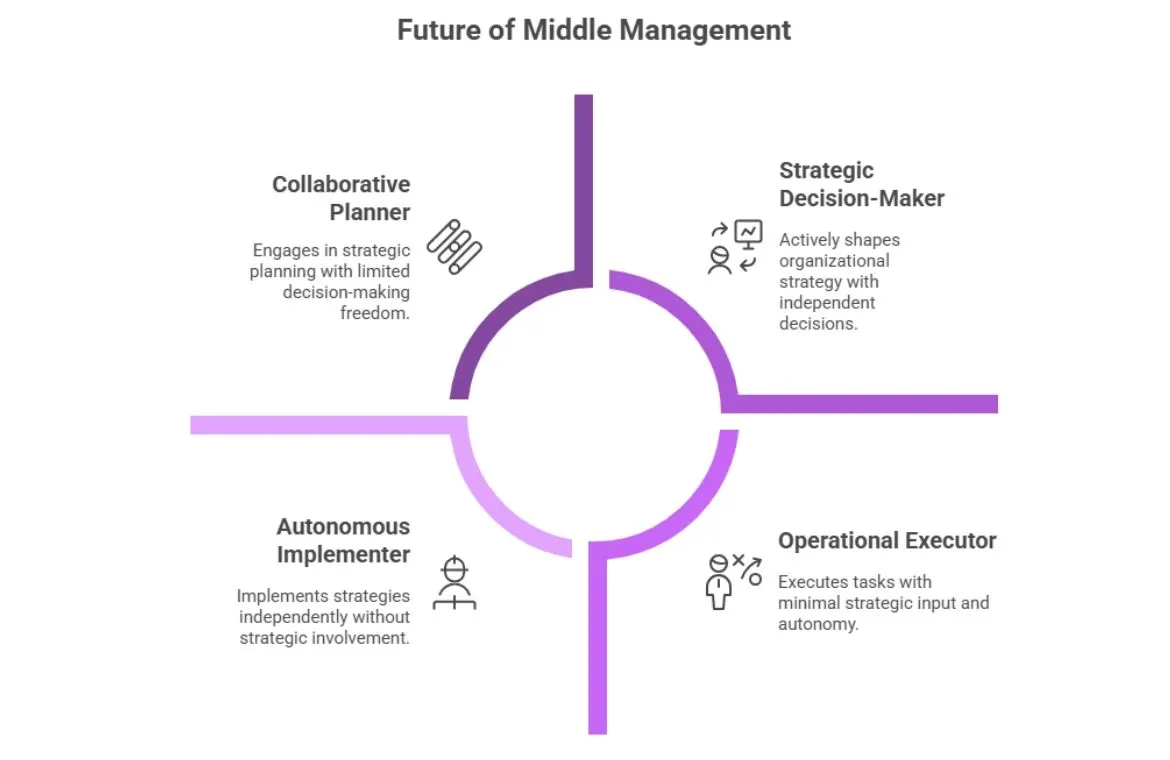What is the Future of Middle Management?

For decades, they've been the sturdy, often unsung, backbone of organizations – the connective tissue between grand visions and ground-level realities. Middle managers. But as the winds of technological disruption howl louder, carrying the whispers of AI, automation, and flatter hierarchies, a critical question echoes through boardrooms and cubicles alike: Is this vital layer of leadership destined for obsolescence, or will it merely evolve, transforming into something we can scarcely imagine? The future of middle management isn't just a corporate puzzle, and it is a fascinating human drama unfolding at the very heart of how we work.
What do you mean by Middle Management?
Middle management refers to the group of managers who are positioned between senior leadership and frontline employees within an organization. They play a crucial role in translating strategic goals set by top executives into actionable plans for operational teams. Middle managers are responsible for overseeing day-to-day activities, coordinating across departments, managing performance, and ensuring that their teams are aligned with broader organizational objectives.
Middle management meaning in modern organizations
Modern organizations place middle management between executive-level leadership and first-line managers. Today's middle managers have more control and accountability. This change helps organizations become more flexible and quick to respond.
This transformation shows a deeper understanding of middle management's worth. McKinsey's research shows middle managers dedicate approximately 23% of their time to leadership tasks like team development and motivation. Companies with strong middle management perform 15% better financially than those with weak middle management.
Key responsibilities and expectations
Middle manager's responsibilities are varied and vital. They focus on worker interactions and manage specific locations, offices, or departments. Top management, meanwhile, handles overall strategy and future planning.
Key duties typically include:
- Creating and implementing daily routines for specific departments
- Tracking employee performance and task assignment
- Following organizational guidelines
- Motivating employees to perform their best
- Boosting productivity and managing resources
- Hiring and keeping employees
- Converting top-level strategy into everyday policies
- Updating senior management on issues and performance
How is middle management changing?

Middle management is known as the critical link between top leadership and frontline teams, and it has long played a pivotal role in executing strategy, maintaining accountability, and managing day-to-day operations. Traditionally, middle managers were seen as operational overseers, focused on supervising tasks, enforcing compliance, and ensuring efficiency. But this role is now undergoing a profound transformation, driven by rapid technological advancements, changing workforce expectations, and evolving organizational structures.
Change from control to cooperation
Middle managers used to direct and micromanage their teams. This old approach doesn't work anymore. The best managers now set clear goals and let their teams achieve them.
Teams now work with leaders instead of under them. Middle managers have become coaches who help connect people's work to their purpose.
Effect of digital transformation
Digital tech has changed middle management by flattening organizations. Technology has given top managers direct access to key data, which has reduced some middle management roles. However, companies with lots of tech need more middle managers in their decentralized systems.
Middle managers help teams adopt new technology. They create specific policies and champion new tools. Better access to information helps them motivate their teams. They can also guide senior management's strategy and use information technology well.
New leadership expectations
Business after COVID focuses more on future talent. Middle managers need to spot talent gaps and help employees grow. They balance monthly goals with other priorities while dealing with constant change.
More cross-functional duties
Middle managers work across departments more than ever. Teams that work together finish projects faster than isolated ones. But these middle managers help transform organizations. They make changes stick and introduce new ways of working. Their role between executives and teams is key. They turn big ideas into local action. Companies that want to move fast need managers who can work across teams. This creates a workflow where decisions and interactions cross department lines.
Challenges and opportunities in the evolving role
Middle managers today face unprecedented challenges as they try to balance operational needs and strategic duties. Their changing role creates major hurdles but also opens doors to growth opportunities that will shape how middle management evolves.
Role ambiguity and decision fatigue
Middle managers often struggle when their job expectations and responsibilities aren't clear. This creates stress.
Several factors create this unclear situation:
- Senior leaders and frontline staff have different expectations
- Various stakeholders make conflicting demands
- Organizations keep changing and restructuring
The challenge becomes worse when managers must handle multiple tasks at once. More than half percentage of managers say they're burned out at work. Many feel stuck between upper management and their teams without enough support.
Balancing strategic and operational duties
Middle managers must handle daily operations while they help shape company strategy. They spend most of their time on operations and very little on strategic planning. This focus on day-to-day tasks often prevents them from doing more valuable work.
Yet these same managers believe they add the most value through strategic work and talent development. This gap between how managers use their time and where they create the most value causes tension in their roles.
Opportunities for leadership growth
Despite these hurdles, middle managers who master these challenges find great opportunities. Companies with strong managers achieve a much better Total Shareholder Return than those with weak managers. This huge difference shows how much effective middle management matters.
The best opportunities come from building specific skills:
- Strategic thinking and execution planning
- Complex problem-solving and decision-making
- Clear communication and idea synthesis
- Coaching team members to boost results
Managers who develop these abilities become "talent multipliers." They help their teams perform better and spread positive changes throughout the organization.
What will the future of middle management look like?

The middle management landscape will change at an unprecedented pace in several important ways.
Increased autonomy and accountability
Middle managers are getting more freedom to make independent decisions. Managers who feel trusted to work independently tend to take more responsibility, make better decisions, and stay motivated. Success in the long run depends on building a culture where accountability and respect grow naturally.
Greater involvement in strategic planning
The future will see middle managers take a more active role in their organization's strategy. Research shows that middle managers' participation adds value to planning and builds stronger commitment to chosen actions. Studies reveal this is a big deal, as it means that managers can use their knowledge of employee mindsets and reporting relationships. Their position helps them turn broader visions into relevant local actions that align goals throughout the organization.
Use of AI and data in decision-making
AI and data are no longer the domain of senior leadership or IT; they are everyday tools for middle managers. This democratization of intelligence is elevating the strategic value of middle management, turning them into insight-driven leaders who can more effectively align operational execution with business outcomes.
In short, the future of middle management lies at the intersection of data, technology, and human leadership.
Managing hybrid and remote teams
Organizations of all sizes worldwide plan to adopt hybrid work models. Successful middle managers will become skilled at leading hybrid teams by:
- Making communication flow smoothly across locations
- Creating fair experiences for remote and on-site staff
- Moving past proximity bias that favors in-office employees
Conclusion
"The strength of any organization lies not at the top, but in the middle, where vision meets execution."
The future of middle management is not about elimination, it’s about evolution. As organizations become more agile, data-driven, and employee-focused, the traditional role of middle managers as task overseers is giving way to a more dynamic function: that of connector, coach, culture-builder, and strategist. In the coming years, middle managers will not just relay instructions from the top, and they will translate vision into action, foster innovation on the ground, and act as emotional anchors in increasingly hybrid workplaces.
Their value will lie in navigating ambiguity, leading people through change, and using AI and data to make timely, intelligent decisions. But this transformation doesn’t happen automatically; it requires awareness, upskilling, and a shift in mindset.
This is where business management courses become a quiet game-changer. Courses that explore organizational behavior, leadership psychology, systems thinking, and data-driven decision-making help aspiring and current managers understand the deeper forces shaping.
Frequently Asked Questions
Q1. How is the role of middle management evolving in modern organizations?
Middle management is shifting from a control-oriented approach to a more collaborative one. Today's middle managers are expected to be strategic partners, translating executive vision into actionable plans, coaching teams, and driving innovation. They're increasingly involved in decision-making and are key to implementing digital transformation initiatives.
Q2. What challenges do middle managers face in their evolving roles?
Middle managers often struggle with role ambiguity, balancing operational and strategic duties, and decision fatigue. Many report high levels of stress due to unclear expectations and excessive workload. They also face the challenge of managing hybrid and remote teams while adapting to technological changes in the workplace.
Q3. What skills are crucial for future middle managers?
Future middle managers need to develop strategic thinking, emotional intelligence, and cross-functional leadership capabilities. They should also focus on building skills in data-driven decision-making, managing remote teams, and fostering innovation. Continuous learning and adaptability are essential in this rapidly changing business environment.

TalentSprint
TalentSprint is a leading deep-tech education company. It partners with esteemed academic institutions and global corporations to offer advanced learning programs in deep-tech, management, and emerging technologies. Known for its high-impact programs co-created with think tanks and experts, TalentSprint blends academic expertise with practical industry experience.



